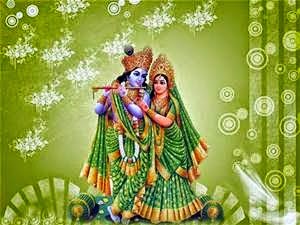Srimad Bhagavadgeeta : Ch-15. Slo-16.
Sunday, September 14, 2014.
Srimad Bhagavadgeeta :
Chapter-15 ( Purushothamyogam )
Slokam-16. ( There are two kinds of being in the world: the perishable and the imperishable state; [of the physical] all the living beings are perishable while of the oneness to the many it is said that one does not perish. )
Dvav imau purushau loke ksharas cakshara eva ca,
Ksharah sarvani bhutani kutastho kshara ucyate.
Loke = In this world;
Ksharah ca Aksharah eva ca = "Ksharam" and "Aksharam;"
Imau dvav purushau = Two purushas are there;
Ksharah sarvani bhutani = ( Out of these two ) All elements are Ksharam;
Kutasthah Aksharah ucyate = ( And the other ) We call Kutasthan as Akshara purushan.
Purushan :- This word means "one lives in Puram," here puram is body. "Pure sayanat purushah"
Kshara :- means Perishable,
Pancha bhutam ( Five elements, such as Akasam, vayu, agni, jalam, bhumi ) , all plants and animal kingdoms, all non-living things are in total called as Prakrati ( Nature ), and this prakrati is Kshara purushan.
Akshara :- means Imperishable,
Kutasthan :- Kutam - This sanskrit word, indicates the iron block used in the workshop of a black-smith, on which the metals all kept and hammered to get different shapes and forms ( metal products ). In this slokam Kutasthan is Akshara purushan .( Atma )
There are two classes of beings, the fallible and the infallible. In the material world every entity is fallible, and in the spiritual world every entity is called infallible.
Lord Krishna explains that in all creation there are only two types of beings in existence. The ksarah or perishable and the aksarah or imperishable. The word ksarah denotes the mutable physical body which is formed by the ingestion of food and is occupied by a sentient being. Similarly the word aksarah denotes an immutable presence, eternal and immortal. Both words are used in the singular sense because they each comprise a category. All jivas or embodied beings in existence whether in physical or subtle bodies from Brahma down to a blade of grass are temporary and transitory and form the category of the perishable. The atma or immortal soul resding within the etheric heart of every jiva is infallible and eternal and it forms the category of the imperishable
Now Lord Krishna is expounding that there are only two types of beings in all the worlds. They are the perishable jivas or embodied beings and the imperishable atmas or immortal souls which is well documented in the Vedic scriptures and known by those enlightened. The perishable consists of all jivas beginning with Brahma, the demigods, humans, animals, fish all the way down to the immovable jivas in forms of trees, plants,etc. The ignorant commonly refer to the word person in respect to bodies only but this conception is not completely accurate. The word aksarah means immutable, infallible or that which is not subject to change and which does not perish when the physical body perishes and is the eternal soul.
Only two types of livining entities exist in creation. They are the ksarah or perishable and the aksarah or imperishable. That which is designated as a jiva or embodied being is known as perishahable, from Bahma to a blade of grass all are subject to limited transitory existences. The singular form of the word atma or immortal soul denotes the totality of all jivas as a category inasmuch as they all possess the atma and are all bound to material nature. The word aksarah meaning infallible, imperishable refers to the freed jiva who is situated in its own eternal, essential nature and not bound by material nature. The word kutasthah means immutable, constant in regard to its lack of associaion with material nature having no connection to the physical plane. The singular use of this word denotes all jivas collectively who are liberated from material nature. It should be understood that such jivas are innumerable as Lord Krishna has revealed previously in chapter 4, verse 10 that many purifying themselves by knowledge and meditation have achieved the supreme, liberated state.
Lord Krishna explains that in all creation there are only two types of beings in existence. The ksarah or perishable and the aksarah or imperishable. The word ksarah denotes the mutable physical body which is formed by the ingestion of food and is occupied by a sentient being. Similarly the word aksarah denotes an immutable presence, eternal and immortal. Both words are used in the singular sense because they each comprise a category. All jivas or embodied beings in existence whether in physical or subtle bodies from Brahma down to a blade of grass are temporary and transitory and form the category of the perishable. The atma or immortal soul resding within the etheric heart of every jiva is infallible and eternal and it forms the category of the imperishable.




Comments